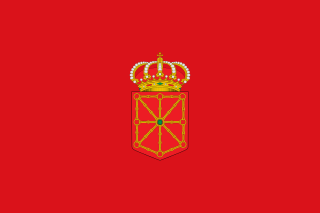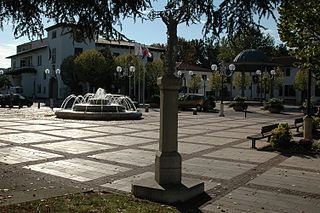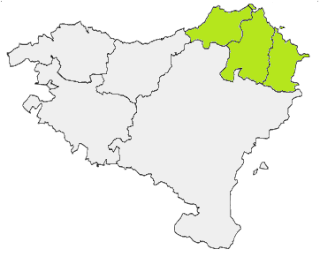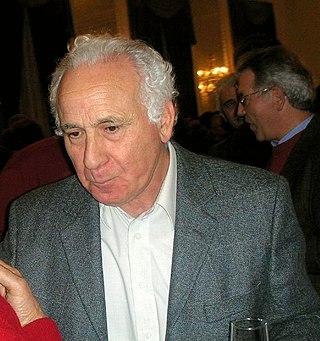
Navarre, officially the Chartered Community of Navarre, is a foral autonomous community and province in northern Spain, bordering the Basque Autonomous Community, La Rioja, and Aragon in Spain and Nouvelle-Aquitaine in France. The capital city is Pamplona. The present-day province makes up the majority of the territory of the medieval Kingdom of Navarre, a long-standing Pyrenean kingdom that occupied lands on both sides of the western Pyrenees, with its northernmost part, Lower Navarre, located in the southwest corner of France.

The Basque Country is the name given to the home of the Basque people. The Basque country is located in the western Pyrenees, straddling the border between France and Spain on the coast of the Bay of Biscay. Euskal Herria is the oldest documented Basque name for the area they inhabit, dating from the 16th century.

The Espelette pepper is a variety of Capsicum annuum that is cultivated in the French commune of Espelette, Pyrénées-Atlantiques, traditionally the northern territory of the Basque people. On 1 June 2000, it was classified as an AOC product and was confirmed as an APO product on 22 August 2002.

Ainhoa is a commune in the Pyrénées-Atlantiques department in the Nouvelle-Aquitaine region in southwestern France.

Anglet is a commune in the Pyrénées-Atlantiques department in the Nouvelle-Aquitaine region of southwestern France.

Catalans are a Romance ethnic group native to Catalonia, who speak Catalan. The current official category of "Catalans" is that of the citizens of Catalonia, an autonomous community in Spain and the inhabitants of the Roussillon historical region in southern France, today the Pyrénées Orientales department, also called Northern Catalonia and Pays Catalan in French.

Ascain is a commune in the Pyrénées-Atlantiques department in the Nouvelle-Aquitaine region of south-western France.

Bardos is a commune in the Pyrénées-Atlantiques department in the Nouvelle-Aquitaine region of south-western France. It is part of the former Basque province of Labourd.

Ayherre is a commune in the Pyrénées-Atlantiques department in the Nouvelle-Aquitaine region of south-western France.

Aïcirits-Camou-Suhast is a commune in the Pyrénées-Atlantiques department in the Nouvelle-Aquitaine region in southwestern France.

Findus is a frozen food brand which was first sold in Sweden in 1945. Findus products include ready meals, peas and Crispy Pancakes, the latter of which were invented in the early 1970s.

The French Basque Country, or Northern Basque Country is a region lying on the west of the French department of the Pyrénées-Atlantiques. Since 1 January 2017, it constitutes the Basque Municipal Community presided over by Jean-René Etchegaray.

Hernani is a town and municipality located in the province of Gipuzkoa, Basque Autonomous Community, Spain. The town sits on the left bank of the Urumea river. It is located at a distance of 9.2 km from San Sebastián. The municipality of Hernani occupies an area of approximately 40 square kilometres and is bordered by San Sebastián, Astigarraga, Arano, Elduayen, Errenteria, Lasarte-Oria and Urnieta.

The Basques are an indigenous ethno-linguistic group mainly inhabiting Basque Country. Their history is therefore interconnected with Spanish and French history and also with the history of many other past and present countries, particularly in Europe and the Americas, where a large number of their descendants keep attached to their roots, clustering around Basque clubs which are centers for Basque people.

Joxe Azurmendi Otaegi is a Basque writer, philosopher, essayist and poet. He has published numerous articles and books on ethics, politics, the philosophy of language, technique, Basque literature and philosophy in general.

The 2013 horse meat scandal was a food industry scandal in parts of Europe in which foods advertised as containing spicy beef were found to contain undeclared or improperly declared horse meat – as much as 100% of the meat content in some cases. A smaller number of products also contained other undeclared meats, such as pork. The issue came to light on 15 January 2013, when it was reported that horse DNA had been discovered in frozen beefburgers sold in several Irish and British supermarkets.
Comigel S.A.S. is a privately owned French food processing company, headquartered in Metz.
À la Table de Spanghero, commonly known as Spanghero, is a French meat processing company based in Castelnaudary, Aude. Products include sausages, cassoulet, minced meat, and ready meals. The Lur Berri cooperative owns 99% of the company through its holding Poujol.
This article lists events from the year 2013 in France:

Nouvelle-Aquitaine is the largest administrative region in France, spanning the west and southwest of the mainland. The region was created by the territorial reform of French regions in 2014 through the merger of three regions: Aquitaine, Limousin and Poitou-Charentes. It covers 84,036 km2 (32,446 sq mi) – or 1⁄8 of the country – and has 5,956,978 inhabitants. The new region was established on 1 January 2016, following the regional elections in December 2015.















